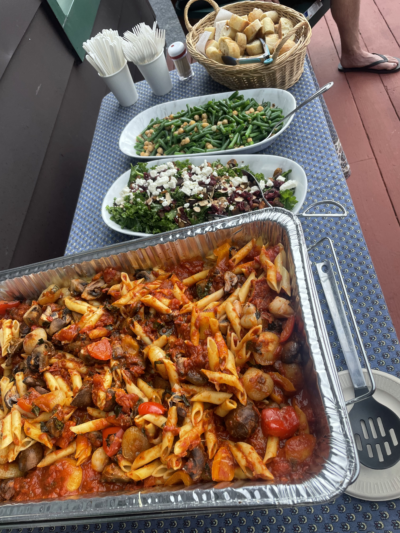
By Coach Lindsay Zemba Leigh
As endurance athletes, we work too hard in training to hinder our training and race performances with nutritional mistakes. As a nutrition coach, here are some of the top mistakes I see athletes making with fueling and weight loss efforts. Let’s recount them here as important reminders to use our fueling and nutrition as a key support for our performance as athletes.
1. Under-fueling everyday nutrition
Playing the “starving game” won’t work. Chronic under-fueling can lead to a depressed immune system, slow recovery from workouts, fat preservation and decreased performance in both workouts and races. Listen to your body’s cues (it’s wise!) — eat when you’re hungry, stop when you’re full, and stick to whole foods packed full of nutrients. Slow and steady wins the weight loss race. Aim for no more than a 250-calorie deficit per day. Any more than this and our bodies may become under-fueled, setting us up for hunger and binging.
2. Under-fueling workouts
This is one of the most common weight loss mistakes I see athletes make. Cutting calories during workouts is never a good idea for many reasons. While some may engage in fasted training, we find that the science doesn’t support this practice for performance or recovery. Studies have found that under-fueling workouts can negatively impact both brain and muscular function, which means that under-fueling workouts will impede recovery, negatively impact how strong we feel and can perform during the workout, and can leave us ravenous later in the day and set us up for a binge. Plus, it’s important to train our guts in workouts the same way we train our muscles so race-day fueling is seamless.
3. Depriving ourselves
Not allowing ourselves favorite foods or treats once in a while can lead to binges, and is a huge weight loss mistake! Treats are important! I firmly believe that “for every diet there is an equal and opposite binge,” as bestselling author Geneen Roth says. Even the word “diet” makes me want to run for chocolate. Stick to the 90/10 rule of eating healthy 90 percent of the time and allowing some treats 10 percent of the time. Or have those high-glycemic treats post workout when they’ll be absorbed and used to restock your glycogen stores instead of being stored as fat.
4. Cutting carbs
Carbs are still endurance athletes’ best friends–no matter how trend fat-forward diets (such as Keto) are, the body is sticking to using carbohydrates as a primary energy source. They are the most accessible source of energy and crucial for fueling and recovering from workouts. Outside of the workout window, stick to unpackaged, unrefined carbs like sweet potatoes, quinoa, oats, beans, fruit and vegetables, etc.
5. Counting calories
It can be helpful to log our food intake for a few weeks to see what our calorie count is, and what our macronutrient breakdown looks like, but there is no need to calorie count forever. Calorie counting can become tedious, create obsessive behaviors and is unnecessary long term. Eating a variety of whole, unpackaged foods while listening to your body’s hunger cues sounds simple, but it’s all you need.
6. Using weight instead of body composition
Most of us have a race weight in our head that we hold onto and feel we are fastest at. I want to encourage to think of a racing body composition, based on body fat percentage and muscle weight. This focus is much more productive and healthier, as you could strive for the race weight but have 5 percent less muscle than you had at the higher weight, losing power on the bike, and overall durability for the longer distances. The body fat scales may not be the most accurate, but they at least give us a relative scale to compare to over the months and years, and they are the easiest way to measure body fat and muscle on your own.
7. Comparison to others
We are all guilty of this one at one time or another, whether it is comparing race results, training techniques and volume, fueling tactics, body composition, etc. Social comparison is never healthy or productive. Every body is unique and has its own ideal body composition and fastest race weight. So, strive to be better than you were yesterday, last week, last year; not better than Susie or Bobby.
As athletes, our bodies are a key tool to our enjoyment of sport and life. Let’s fuel our bodies well so they can move the way we want them to!
If you want more assistance with your daily nutrition, consider our 10-week Nutrition Coaching program to help you dial in your needs for optimal performance and health. No Limits athletes and #NLECrew members get 10% off this service!
